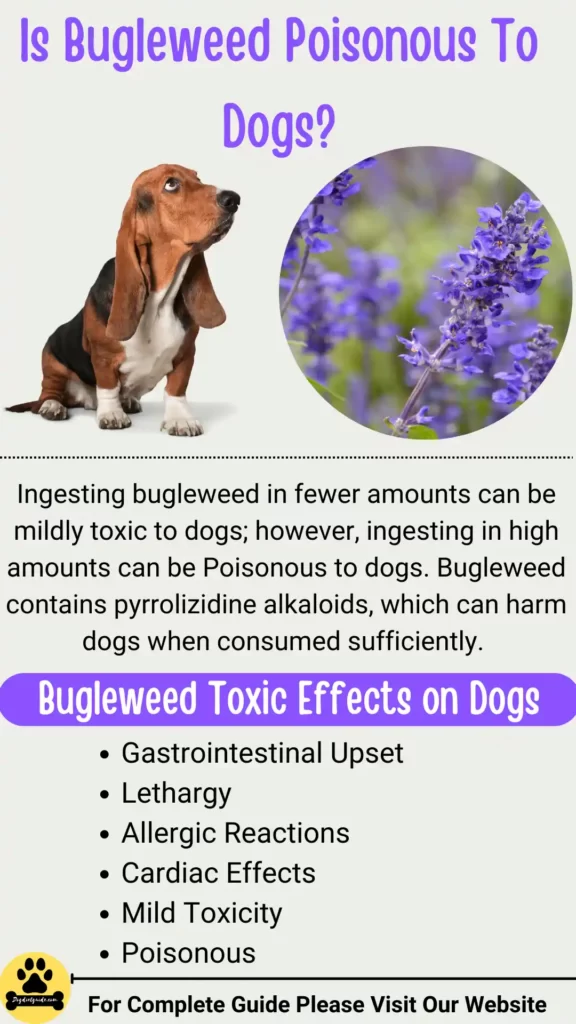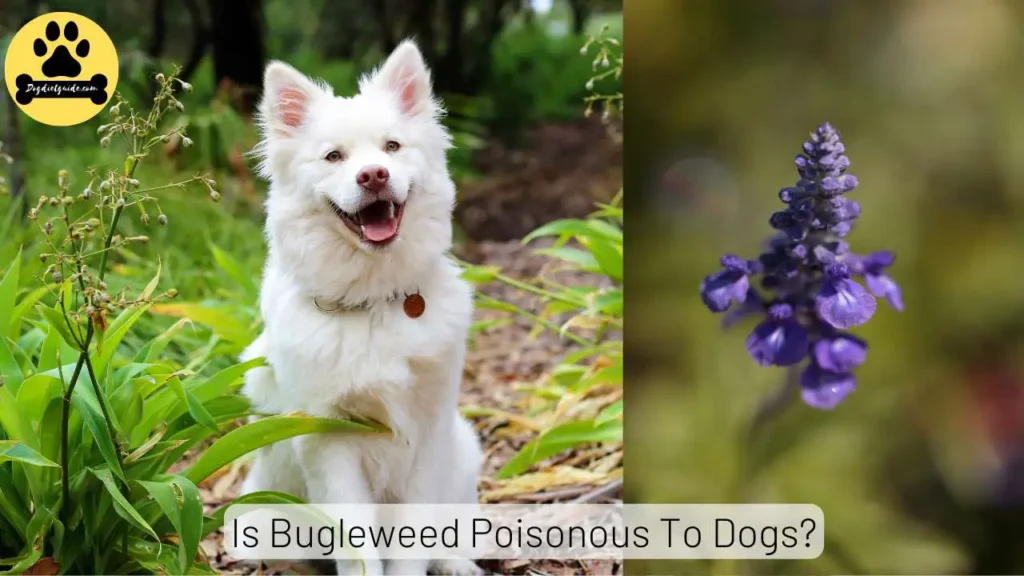Regarding the safety and well-being of our dogs, we are often cautious about the foods, plants, and substances that our furry friends may come into contact with. One such concern is the potential toxicity of bugleweed to dogs. So, Is bugleweed poisonous to dogs?
Ingesting bugleweed in fewer amounts can be mildly toxic to dogs; however, ingesting in high amounts can be Poisonous to dogs. Bugleweed contains pyrrolizidine alkaloids, which can harm dogs when consumed sufficiently.
Ingesting bugleweed in excessive amounts may lead to symptoms such as gastrointestinal upset, vomiting, diarrhea, and in severe cases, liver damage.
It’s important to ensure that your dog doesn’t have access to bugleweed or other potentially toxic plants in your garden or surroundings.
If you suspect your dog has ingested bugleweed or any other toxic plant, you should contact your veterinarian immediately for guidance and appropriate care.
Understanding Bugleweed
Bugleweed, scientifically known as Ajuga reptans, bugle, blue bugle, bugleherb, bugleweed, carpetweed and carpet bugleweed is a low-growing perennial plant that belongs to the mint family.
Known for its attractive foliage and vibrant flowers, bugleweed is often used as a ground cover in gardens and landscapes.
However, its popularity among garden enthusiasts has led to concerns about its potential toxicity to dogs.
Is Bugleweed Poisonous To Dogs?
Ingesting Bugleweed can be poisonous to dogs. The plant contains natural compounds, including pyrrolizidine alkaloids, which are substances known for their potential toxicity to both humans and animals.
Some plants produce alkaloids as a protective mechanism; consuming these compounds in significant amounts can harm the liver and other organs.

Bugleweed Toxic Effects on Dogs
While bugleweed is not among the most highly toxic plants, it’s important to be aware of its potential effects on canines.
Here are some potential toxic effects of bugleweed on dogs:
-
Gastrointestinal Upset: Ingesting bugle may lead to gastrointestinal distress in dogs. Symptoms may include vomiting, diarrhea, drooling, and abdominal discomfort.
-
Lethargy: Might cause your puppy to become lethargic or unusually tired.
-
Allergic Reactions: Dogs can have allergic reactions to blue bugle, resulting in skin irritations, itching, or hives.
-
Cardiac Effects: Bugleweed is often used for its potential to affect the thyroid gland and heart rate in humans. In canines, it could change heart rate or rhythm if consumed significantly.
-
Mild Toxicity: While carpetweed is not generally considered highly toxic, the accumulation of toxins in a dog’s system due to prolonged or repeated exposure could lead to more severe symptoms.
-
Poisonous: Excessive consumption of bugle can be poisonous for your furry friend, potentially resulting in severe health complications and, in some cases, even proving fatal.
How to Know if Your Dog Has Eaten Something Toxic?
If you suspect your dog may have ingested something toxic, acting quickly and seeking veterinary assistance is important.
Here are some signs to watch for:
-
If your pet suddenly starts vomiting or experiencing diarrhea, especially repeatedly, this could be a sign of toxic ingestion.
-
A sudden loss of interest in food can indicate something is wrong. However, remember that puppies occasionally have off days, so this symptom alone may not be conclusive.
-
If your pooch becomes unusually tired, weak, or lethargic, it could be a sign of toxicity.
-
Toxic substances can affect a dog’s behavior. Look for signs of restlessness, agitation, confusion, or uncharacteristic aggression.
-
Some toxins can cause excessive drooling and increased thirst.
-
Ingesting certain toxic substances can lead to tremors or seizures. If your dog experiences these symptoms, seek immediate veterinary care.
-
If they appear unusually pale or yellowish, it could indicate toxicity.
-
Rapid, labored breathing or coughing can indicate a toxic reaction.
-
A very fast or slow heartbeat can indicate a problem.
-
Toxic substances can affect urinary habits. Look for signs of increased or decreased urination or difficulty urinating.
First Aid
Call your vet immediately or poison control helpline and describe the situation. They can guide whether to bring your dog in for treatment.
If your pet shows severe symptoms such as seizures, collapsing, or difficulty breathing, visit an emergency veterinary clinic as soon as possible.
If you can safely do so, identify what your pooch might have ingested. This will help the veterinarian provide appropriate treatment.
Do not try to induce vomiting without consulting a veterinarian first. Some toxins can be more harmful if vomited.
If you know what your pup ingested, keep the packaging or container to show to the vet.
Remember, it’s always better to err on the side of caution. Contact a veterinarian for advice if you’re ever unsure about your dog’s health. Taking prompt action can greatly impact the outcome for your pet.
It’s crucial to recognize that not all dogs will react to bugleweed similarly. Some dogs may be more sensitive to the plant’s compounds, while others may have a higher tolerance.
Read More From Our Dog Food Guide:
Final Thoughts: Is Bugleweed Poisonous To Dogs?
While a less amount of bugle may not be highly poisonous to dogs, it’s essential to prioritize their safety by minimizing their exposure to potentially harmful plants.
Following the recommended precautions and providing a dog-friendly environment ensures that your furry friend enjoys a healthy and joyful life surrounded by an atmosphere that promotes their well-being.
Your efforts to safeguard your pet from potential hazards reflect the true essence of a loving and caring pet owner.

References:
https://www.aspca.org/pet-care/animal-poison-control/toxic-and-non-toxic-plants
https://www.encyclopedia.com/medicine/encyclopedias-almanacs-transcripts-and-maps/bugle-weed




![Can Dogs Eat Blood? 7 Side Effects [Expert Opinion]](https://petskor.com/wp-content/uploads/2022/04/Webp.net-resizeimage-12.jpg)
